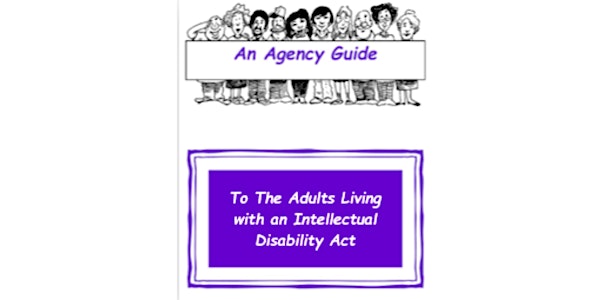
Registrations are closed
Sales have ended for this event, but be sure to check out our upcoming sessions.
An Agency Guide To The Adults Living with an Intellectual Disability Act
The Agency Guide to the ALIDA provides learners with an introduction to the rights of Manitobans living with an intellectual disability.
Date and time
Location
Pulford Community Living
1146 Waverley Street Winnipeg, MB R3T 0P4 CanadaAbout this event
- 7 hours
This 7-hour in-person session will support learners to engage in discussion and activities around:
- Manitoba's history of how supports for people living with a disability have emerged, developed and changed over the years
- The definition of an intellectual disability
- The five guiding principles of the legislation
- The differences between the ALIDA and the Mental Health Act
- The importance of language and how it can frame our attitudes and approaches to persons with intellectual disabilities
- The nature of assisted decision-making, as well as the process and implications of appointing substitute decision makers
- A brief segment on protection from abuse and neglect
- The evolution of the ALIDA and the changes that have occurred and those that are planned for the future
- Making a personal plan, as a supporter, that includes ways you can support people that are aligned with the ALIDA.
If you have questions or require any specific accommodation to attend, please contact Abilities Manitoba at training@abilitiesmanitoba.org.
Please, bring a pen, water, lunch, and anything else to ensure you are comfortable for the day.
An Agency Guide to the Adults Living With An Intellectual Disability Act
Five Guiding Principles
1. Adults living with an intellectual disability are presumed able to make their own decisions.2. Adults living with an intellectual disability should be encouraged to make their own choices.3. If an adult living with an intellectual disability needs help to make a choice, the legislation encourages friends, family, and service providers to help him/her understand the choices to make an informed decision.4. Any help provided must be respectful of the adult living with an intellectual disability's privacy and dignity as an adult. 5. 5. There may be a decision that the adult living with an intellectual disability is unable to make, even with help. As a last resort a substitute decision maker can be identified.
Decision Making Scenarios
In small groups, read your scenario and then discuss what you should do. Some questions you can ask that might be helpful include:
1. How will you respond using the guiding principles? 2. What does the person need in order to make an informed decision? 3. What is the most respectful, least intrusive and least restrictive way to support the person? 4. If there is an SDM, how should they be involved?
Decision Making Scenario #1:Tom is very social and enjoys getting to know other people, especially communicating with them online through social media. Tom is very trusting, and does not fully understand the risks when interacting online. Recently, Tom was scammed by others when he gave them access to his bank account. Despite this incident, he continues to freely interact with numerous people via the Internet and has often invited strangers to come visit him at his home.
His support worker has repeatedly tried to instill caution in Tom, but he often forgets about safety when engaged with other individuals through his tablet. The support worker is considering whether to restrict Tom’s access to the tablet in order to better protect him.
Decision Making Scenario #2:Luke lives in an apartment and requires support three days per week for his daily living tasks including driving him to the store to shop for groceries and other needs. Luke has an alcohol dependency that creates safety issues and behavioural concerns. While intoxicated, Luke has frequently damaged his apartment and behaved abusively toward his support workers and others. There have also been incidents in which Luke has invited people back to his apartment who have assaulted and robbed him.
Luke often asks his support worker to bring him to the liquor store. The support worker and their manager have discussed refusing to take Luke to buy alcohol in order to prevent him from drinking.
For more resources and info on this Act, visit our Resources Hub: https://padlet.com/abilitiesmanitoba/the-manitoba-agency-guide-to-the-vulnerable-persons-act-gu6vo4uxf48476ma
Please, take a moment to complete our quick Training Feedback Survey: https://forms.office.com/r/FhDDFX5EYe